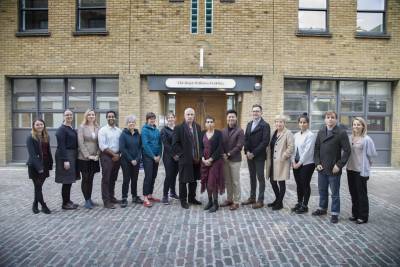
Leaders: Alun Hughes, Nish Chaturvedi, Bryan Williams
Group Members:
Senior staff
Charlotte Manisty (Senior Lecturer in Cardiology); Therese Tillin (Senior Lecturer in Epidemiology)
Scientific and Technical
Sophie Eastwood (Clinical Epidemiologist); Peter Lacy (Senior Research Associate); Suzanne Williams (Ultrasound Lead); Chloe Park (Research fellow); Anish Bhuva (BHF Clinical Fellow); Katherine March (Ultrasound Advisor)
Project staff
Hassina Furreed (Study Nurse); April McGowan (Project Assistant); Livia Urbanova (Project Assistant); Dan Key (IS manager); Alicja Rapala (Study Manager); Ewan McFarlane (Clinical Research Assistant); Dawid Jedrzejewski (Clinical Research Assistant); Donna Moskal-Fitzpatrick (Clinical Studies Administrator)
Postgraduate students
Siana Jones (PhD student); Marco Molinari (PhD student co-supervised with Department of Statistical Science); Lorna Smith (PhD student co-supervised with Institute of Neurology); Jujing Su (PhD student co-supervised with Department of Pharmacology, University of Aarhus); Hannah Taylor (PhD student)
Support Staff
Tom Carson (Group Administrator)
Overview
Mission statement - To develop, apply and exploit innovative and detailed non-invasive phenotypic characterisation techniques in observational studies and clinical trials to further understanding of aetiology, mechanisms and targets for intervention in cardiometabolic disease and hypertension.
Highlights
Population Cohort Studies - Several key papers from the Southall and Brent Revisited (SABRE) cohort have been published (Chaturvedi, Hughes), highlighting marked ethnic differences in cardiometabolic risk and potential explanations for such differences. Our work informed NICE guidelines as to obesity cut-points to screen for diabetes in high risk ethnic minority groups. Chaturvedi has been appointed Director of the MRC Lifelong Health and Ageing Unit, which houses the MRC National Survey of Health and Development (1946 Birth Cohort). Publications from this study have highlighted the importance of life course influences on cardiovascular risk. We were awarded a programme grant of c. £2 million from the BHF to continue follow up of the SABRE cohort (PI Chaturvedi), and another £1M grant to study participants in the Avon Longitudinal Study of Parents and Children (ALSPAC) at age 25y (PI Hughes.). We are also using UK Biobank data to better understand relationships between glycaemia and non-communicable disease, and the role of medication (PI Chaturvedi).We are also part of an MRC /BHF-funded stratified medicines consortium (Kings, Cambridge, Nottingham, Glasgow, Manchester, Queen Mary, MRC Biostatistics Unit, Mayo Clinic and Foundation, University of Florida) examining whether treatment for high blood pressure can be improved by taking account of a person’s ethnic heritage (CI Hughes/Chaturvedi). A renewal of the prestigious British Heart Foundation PhD student programme was awarded in 2016 and is directed by Hughes. Hughes also co-leads the new iBSc module, Clinical Case Studies in Cardiovascular Medicine and is deputy course director of the iBSc in Cardiovascular Science.
Hypertension - Our work focusses on better stratification of treatment of hypertension, clinical trials with embedded mechanistic studies of Hypertension target organ damage and non-invasive studies of cardiovascular haemodynamics and blood pressure phenotyping. We (Williams, Lacy) received the Times Higher University Award in 2011 for outstanding contribution to innovation and technology for our work developing novel methods for non-invasive measurement of aortic pressure (Williams, JACC 2011) and we are applying this methodology to investigate its role in better stratification of treatment for younger patients with stage 1 hypertension using deep cardiovascular MRI phenotyping (NIHR EME/MRC £1M). We are also evaluating relationships between brachial and central aortic pressure in young people in large population cohorts in China. An example of our recent clinical trial work is the PATHWAY-2 study of optimal treatment for drug-resistant hypertension (Williams, Lancet 2015) and studies of the treatment of hypertension in diabetes (Lancet, NEJM 2014, NEJM) and self blood pressure management strategies (Lancet 2010, JAMA 2014). In collaboration with Chemistry (Arstad) we are developing novel PET-tracers for the diagnosis of aldosterone-producing adenomas. We are about to commence further studies evaluating novel device-based therapies for the treatment of resistant hypertension. We have provided leadership in translation and guidelines in hypertension, Williams chaired the current NICE hypertension guideline development group (2011), is Chair of the European Hypertension guideline development group and Chairman of the European Society of Cardiology Council on Hypertension.
Focus of future research - Our detailed cardiometabolic phenotyping work will be much enhanced by the planned opening of the NIHR-BHF Bloomsbury Centre for Clinical Phenotyping in early 2017. Future studies using precision phenotyping on the 1946 and 1958 birth cohorts, SABRE and Whitehall II.
 Close
Close


